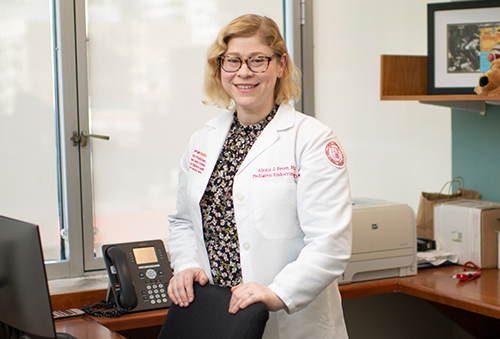Exploring the inequities of COVID-19 in racial-ethnic minority groups has been the focus of a body of research, with findings that demonstrate these groups are disproportionately affected by the pandemic.
Following this thread, Alexis J. Feuer, MD, Director of the Pediatric Diabetes Program at NewYork-Presbyterian Komansky Children's Hospital, joined a team coordinated by T1D Exchange, a Boston-based population health research organization focused on Type 1 diabetes. Together they examined the possible links between race and ethnicity and Type 1 diabetes, COVID-19, and diabetic ketoacidosis.

Dr. Alexis Feuer
“This is the first multisite surveillance study of people with Type 1 diabetes and COVID-19 evaluating racial-ethnic disparities in Type 1 diabetes outcomes,” the authors write. “Our findings underscore the high risk that racial-ethnic minorities face from COVID-19 and Type 1 diabetes, signaling to clinicians that further interventions are needed to prevent and provide a tailored approach to mitigate poor outcomes.”
Looking to establish whether diabetic ketoacidosis was more common in Non-Hispanic Black and Hispanic patients as compared to Non-Hispanic White patients with both Type 1 diabetes and a laboratory-confirmed COVID-19 diagnosis, researchers conducted a cross-sectional study of 52 clinical sites from April to August 2020. Of the 180 patients included in the study, 79 were Non-Hispanic White, 55 were Non-Hispanic Black, and 46 were Hispanic.
After obtaining data via an online survey from each clinical site, they used multivariable logistic regression analysis to adjust for potential confounders such as age, sex, insurance, and last glycated hemoglobin A1c (HbA1c) level while examining any potential link between race/ethnicity status and diabetic ketoacidosis.
Results of the study include:
- Non-Hispanic Black patients in the study were four times more likely to present with diabetic ketoacidosis compared to Non-Hispanic White patients. These results are statistically consistent after adjusting for age, sex, last HbA1c value, and insurance status. The authors note, “Our findings demonstrate that Non-Hispanic Black patients with COVID-19 and Type 1 diabetes have an additional risk of diabetic ketoacidosis beyond the risk already conferred from having longstanding diabetes or being of minority status.”
- Hispanic patients surveyed also had greater odds of presenting with diabetic ketoacidosis as compared to the Non-Hispanic White patients in the study, but not enough to be statistically significant.
NewYork-Presbyterian and Weill Cornell Medicine are undertaking a joint effort to reshape the delivery of pediatric outpatient subspecialty care in an effort to decrease inequity, an effort informed by this study and other ongoing studies demonstrating inequity in pediatric diabetes care. This unique effort aims to address the inequities rather than simply describe their existence and causes.



